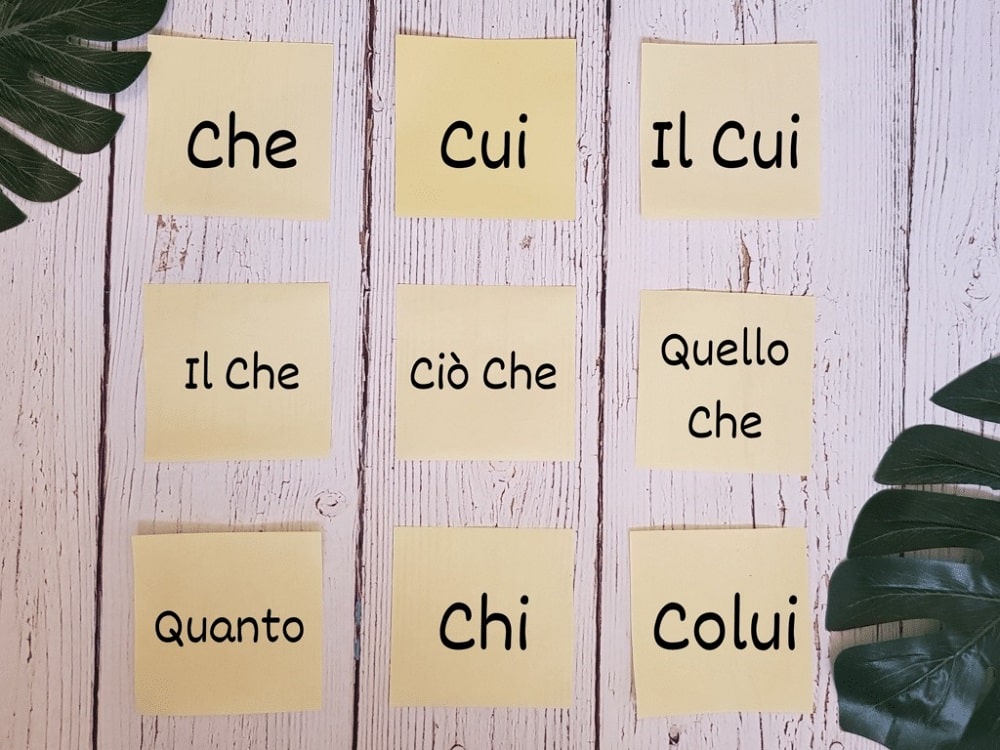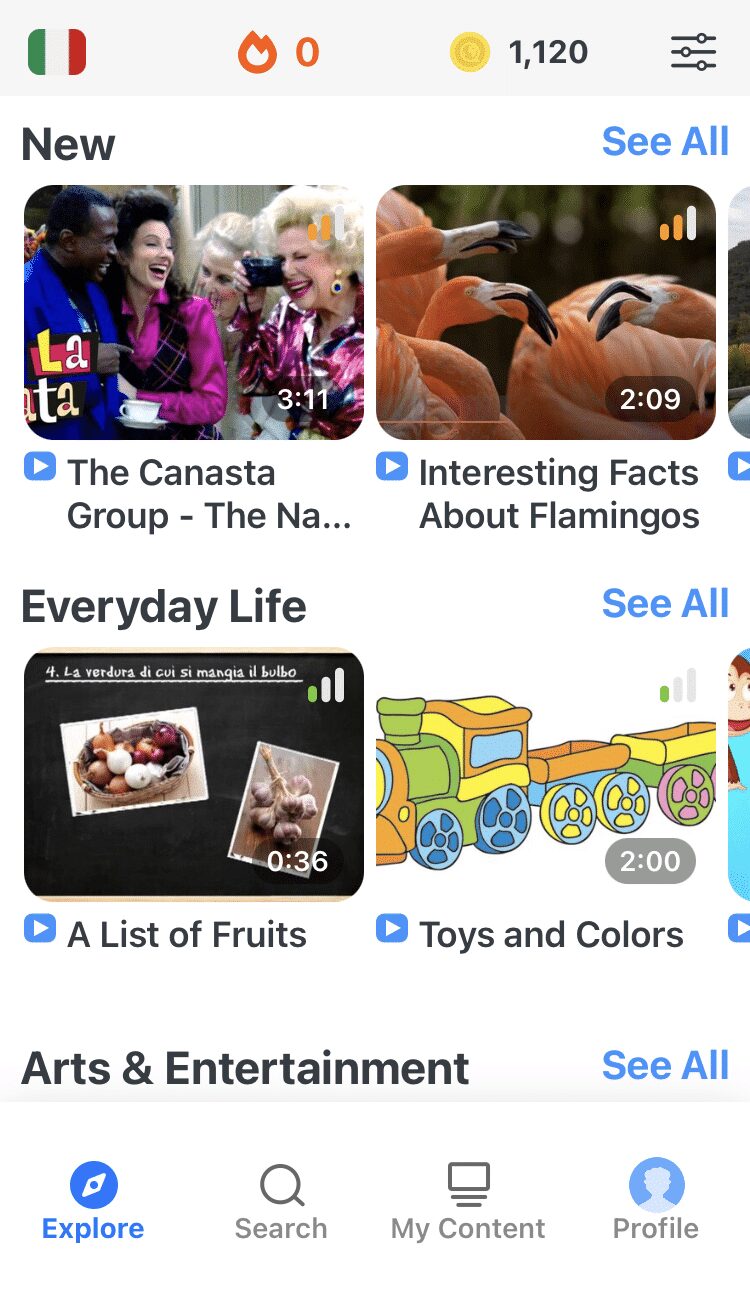The 12 Most Common Italian Relative Pronouns

When you want to string together thoughts more complex than “ti amo,” you often need relative pronouns—like the bolded word in Raffaella è la ragazza che mi ha spezzato il cuore. (Raffaella is the girl who broke my heart.)
Like their English counterparts who, which, to whom and that, Italian relative pronouns introduce the relative clause and give more information on the thing (or Italian bombshell) being talked about.
Let’s go over some relative pronouns in Italian.
Please note that I’m only going to cover the most common and most challenging relative pronouns for intermediate learners, so the post assumes that you’re past the basics and have a good understanding of Italian pronouns, Italian articles and their relationship with gender and number.
Download: This blog post is available as a convenient and portable PDF that you can take anywhere. Click here to get a copy. (Download)
1. Che
I consider che the hero of Italian relative pronouns simply because it’s the most flexible. It can be both a subject and an object, as well as a person and a thing.
Che can also be used for any gender and number and doesn’t change its form depending on the context—which is unfortunately not the case for some other relative pronouns, but we’ll get to those in a bit.
For now, here’s che as an object and a subject:
| Che as an Object | Che as a Subject |
|---|---|
| Quello è il treno che ho preso ieri. | Quello è il treno che va a Roma. |
| That is the train that I took yesterday. (Che is the object of ho preso or "I took.") | That is the train that goes to Rome. (Che is the subject for the verb va or "goes.") |
Jack-of-all-trades che can also refer to people, as we saw in the introductory example. Here’s another one with my muse Raffaella:
Ma è Raffaella che amo.
But it’s Raffaella whom I love.
2. Cui
Cui is essentially another form of che when the latter follows certain prepositions. These prepositions are altered according to the verb in the relative clause.
| Italian Preposition | Example Sentence | English Translation |
|---|---|---|
| a (to) | La donna a cui ho regalato la rosa | The woman to whom I gave a flower |
| È il ragazzo a cui ho dato il biglietto. | He's the guy to whom I gave the ticket. | |
| in (in) | Il Paese in cui vivo | The country in which I live |
| La dea in cui credo è vendicativa! | The goddess in whom I believe is vindictive! (You can also translate this as "The goddess I believe in is vindictive!") | |
| con (with) | I musicisti con cui suon | The musicians with whom I play |
| Sono i clienti con cui parlo tutti i giorni. | They are the clients with whom I speak every day. | |
| da (from; note that this is only one of many possible translations of da) | Il macellaio da cui mi servo è molto bravo. | The butcher whom I frequent is very good. (Literally, "from which I serve myself") |
| La montagna da cui scende il fiume è spettacolare. | The mountain from which the river flows is spectacular. | |
| di (about) | È il vicino di cui so sempre tutti i gossip. | He is the neighbor about whom I always know all of the gossip. |
| Sono i clienti di cui parlo tutti i giorni. | They are the clients about whom I speak every day. | |
| per (for) | Il cliente per cui scrivo | The client I write for (Literally, "for whom I write") |
| La donna per cui lavoro | The woman I work for (Literally, "for whom I work") |
3. Il Quale
Il quale means the same thing as che when used as a relative pronoun. However, there are fewer situations where it’s appropriate.
Specifically, it can only be the relative pronoun subject. You can think of il quale as replacing the English “who” but not replacing the English “whom” when it’s a direct object.
Here it is as a subject:
Ho parlato con l’uomo il quale mi ha detto di aspettare.
I talked to the man who told me to wait.
Che would be okay to use here, too. You could say:
Ho parlato con l’uomo che mi ha detto di aspettare.
I talked to the man who told me to wait.
On the other hand, you cannot use il quale when the referent is a direct object, so you must use che instead:
La donna che ho invitato a ballare
The woman whom I invited to dance
Il quale tends to sound better when you use it to talk about people rather than physical objects. For example, in the incorrect phrase quello è il treno il quale va a Roma (that is the train that goes to Rome), il quale sounds a little bit off. It would better to use che here.
Also, il quale changes according to the gender and number of the thing it refers to. It can become la quale , i quali or le quali , for example.
Sure, this aspect of il quale complicates things, but it can also be quite useful for clarifying what or who exactly is being referred to.
For instance:
La madre del ragazzo, il quale prende il treno a Roma
The mother of the guy who is taking the train to Rome
In the above example, we know that il ragazzo (the guy) himself is on the train.
On the other hand:
La madre del ragazzo, la quale prende il treno a Roma
The mother of the guy, who is taking the train to Rome
In this second example, it’s la madre (the mother) on the train.
Neat trick, huh? The gender, il quale or la quale, tells you who you’re talking about in the second clause (the guy or the mother, respectively).
If you were to use the word che instead, that would still be technically correct, but there’s more ambiguity on who exactly is on that train, like in la madre del ragazzo che prende il treno a Roma, where you have no idea whether it’s the mother or the guy who’s taking the train.
Thus, in some instances, the gender/number modified version of il quale is preferable for clarity’s sake.
As an aside, English is less clear in similar cases than Italian, because the former doesn’t necessitate the modification of relative pronouns like “who” based on gender. So, as much as studying Italian grammatical gender makes you want to curse the high heavens, you have to admit that it makes what you say in Italian sound clearer than in English.
Il Quale and Prepositions
Like che, il quale can also come with prepositions, in which case the standard modifications apply according to the article, gender and number used with it.
| Example Sentences of Il Quale With Prepositions | English Translation |
|---|---|
| È il ragazzo al quale ho dato il biglietto. | He's the guy to whom I gave the ticket. |
| La donna alla quale ho regalato la rosa | The woman to whom I gave the rose |
| Le donne alle quali ho regalato le rose | The women to whom I gave the roses |
| Il Paese nel quale abito | The country in which I live |
| Il cliente per il quale scrivo | The client I write for (Literally, "for whom I write") |
| La donna per la quale lavoro | The woman I work for (Literally, "for whom I work") |
| Sono i clienti con i quali parlo tutti i giorni. | They are the clients with whom I speak every day. |
| Sono i clienti dei quali parlo tutti i giorni. | They are the clients about whom I speak every day. |
4. Il Cui
When you want to tack on a description about a possession, as you would with the word “whose” in English, one of your options is il cui (or its modified forms la cui , i cui and le cui ).
Raffaella, il cui zaino è molto bello, è arrabbiata.
Raffaella, whose backpack is very beautiful, is angry.
5. Del Quale
Another way to say “whose” in Italian is del quale (or della quale , dei quali and delle quali )
Here’s an example:
Raffaello, lo zaino del quale prendo in prestito, è arrabbiato.
Raffaello, whose backpack I’m borrowing, is angry.
Notice that del quale must come after the noun ( zaino or backpack/rucksack) whereas il cui always comes before.
You’ll also notice that del quale (like il quale) can sometimes be clearer since it specifies the gender and number of the thing being referred to.
6. Il Che
Generally, il che is used to refer to a previous concept or action, rather than just a simple noun.
Loro si sono lasciati, il che mi rende triste.
They broke up, which makes me sad.
7. Ciò Che
/ Quello Che
Both ciò che and quello che serve a similar function, and roughly mean “that which” in English. To the Italian ear, they don’t sound as awkward as their literal English translation.
| Ciò Che in Action | Quello Che in Action |
|---|---|
| Non mi piace ciò che fanno i brasiliani. | Gli scioperi sono quello che causa più problemi con i treni. |
| I don't like "what" or "that which" Brazilians do. | The strikes are "what cause" or "that which causes" more problems with the trains. |
8. Quanto
When the referent can be quantified, the word quanto (how much) can be used instead.
| Example Sentences With Quanto | English Translation |
|---|---|
| Mi ha sorpreso quanto hai pagato per il biglietto. | It surprised me how much you paid for the ticket. |
| Non mi ha sorpreso quanto abbiamo aspettato per il treno. | It didn't surprise me how much we waited for the train. |
9. Tutto Ciò Che / Tutto Quello Che
Tutto quello che and tutto ciò che literally mean “all that which” and function a bit like “whatever,” “anything” or “everything.”
| Tutto Ciò Che in Action | Tutto Quello Che in Action |
|---|---|
| Posso prepararti qualcosa?
(Can I cook something for you?) Sí! Prepara tutto ciò che vuoi, ma non cose piccanti. (Yes! Make whatever you want, but nothing spicy.) | Posso farti una domanda?
(Can I ask you a question?) Chiedimi tutto quello che vuoi. (Ask me whatever you want.) |
10. Tutti Quelli Che
To refer to a bunch of people, use tutti quelli che (all those who).
Tutti quelli che hanno problemi, mi chiamano.
All those who have problems call me.
11. Chi
To refer to an everyman, anyone or “he who,” you can use chi.
Chi è senza peccato scagli la prima pietra.
May he who is without sin cast the first stone.
Chi can also be used to mean “some people.” In this case, it’s coupled with a second phrase starting with chi to describe what “some others” were doing at the same time. For example, if someone asked you Che faceva la gente ieri alla festa? (What were people doing at the party yesterday?), you’d say:
Chi chiacchierava, chi ballava.
Some were chatting, [while] others were dancing.
12. Colui
Those who wish to sound a bit more pompous and literary may use colui instead of chi to get the same meaning:
Colui che è senza peccato scagli la prima pietra.
Let he who is without sin cast the first stone.
Practicing Italian Relative Pronouns
Now that you’ve examined the undercarriage of Italian relative pronouns, it’s time to hop on yourself and go for a ride.
What related phrases can you hook together about your Raffaellas, mothers of friends on trains or butchers?
Relating the grammar constructions to your own life will make them much more memorable and useful.
Also, you can do many more carefully guided activities with native Italian videos using a language learning program like FluentU.
FluentU takes authentic videos—like music videos, movie trailers, news and inspiring talks—and turns them into personalized language learning lessons.
You can try FluentU for free for 2 weeks. Check out the website or download the iOS app or Android app.
P.S. Click here to take advantage of our current sale! (Expires at the end of this month.)
Speaking of Italian videos, Rino Gaetano is about to take the use of the relative pronoun chi habit to the extreme, using it in nearly every line of his lyrics.
You can follow along with the video using this English translation, which can help you understand some of the more complex vocabulary. Now that you know the proper meaning of chi (particularly the “some … others” construction), you’d know better than to translate it as “who” in this context.
So, what’s Gaetano really trying to say here with chi? The singer’s idea is that “some people” do blah blah blah, “others” do whatever else.
For a more complete look at relative pronouns, my top pick is the textbook “Soluzioni: A Practical Grammar of Contemporary Italian,” which has an entire chapter on the subject.
Other websites (like Learn Italian Daily and Treccani) explain relative pronouns with a bit less detail than in this article. Still, the shorter format could be useful for ensuring you get the basics down. And if you’re up for it, you can practice your Italian relative pronouns on a site like Zanichelli.
Whatever learning approach you take, may the relative pronouns not give you the blues. And may you find your own Raffaella!
Download: This blog post is available as a convenient and portable PDF that you can take anywhere. Click here to get a copy. (Download)
And One More Thing...
If you're as busy as most of us, you don't always have time for lengthy language lessons. The solution? FluentU!
Learn Italian with funny commericals, documentary excerpts and web series, as you can see here:

FluentU helps you get comfortable with everyday Italian by combining all the benefits of complete immersion and native-level conversations with interactive subtitles. Tap on any word to instantly see an image, in-context definition, example sentences and other videos in which the word is used.

Access a complete interactive transcript of every video under the Dialogue tab, and review words and phrases with convenient audio clips under Vocab.

Once you've watched a video, you can use FluentU's quizzes to actively practice all the vocabulary in that video. Swipe left or right to see more examples of the word you’re on.

FluentU will even keep track of all the Italian words you’re learning, and give you extra practice with difficult words. Plus, it'll tell you exactly when it's time for review. Now that's a 100% personalized experience!
The best part? You can try FluentU for free with a trial.
Start using the FluentU website on your computer or tablet or, better yet, download the FluentU app from the iTunes or Google Play store. Click here to take advantage of our current sale! (Expires at the end of this month.)








